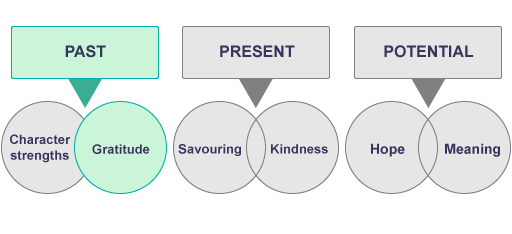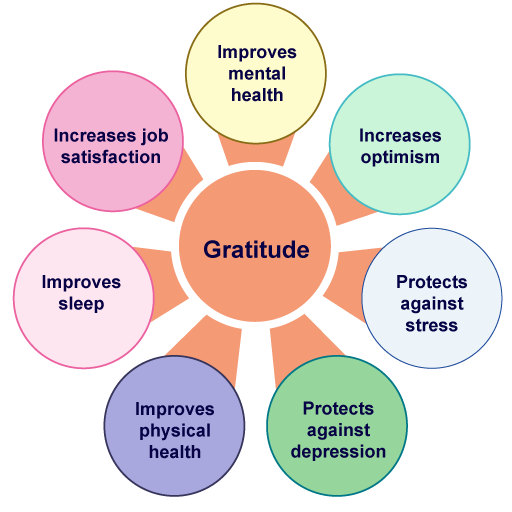Use 'Print preview' to check the number of pages and printer settings.
Print functionality varies between browsers.
Printable page generated Saturday, 22 November 2025, 3:34 PM
Unit 3: Gratitude
The second of six themes
Throughout this course you are introduced to some of the ways you can boost your happiness and wellbeing, and that of your children, using six key themes that have been shown to improve wellbeing through the way we think about the past, present and future potential.
The second of these six themes is illustrated in the diagram below.
For this second theme, you are shown some practical activities that you can try at home. The benefits of these have all been supported scientifically and can be attempted by yourself during the course. They can also be adapted to work with children of all ages within the home. Being a good role model to our children is also a great way to help enhance their wellbeing.
 Mindful minute
Mindful minute
To start each unit, it is helpful to try to switch off from what has been happening in your day and greet your learning from a place of relaxation.
The following exercise can be a way of doing this, so please feel free to try this. Alternatively, you may have your own way of switching off from the distractions of your day, like making a hot drink or putting on some calming music.
Sit in a comfortable position with your hands resting on your lap. Try to keep your back, neck and head straight and place both of your feet flat on the floor.
Bring your attention to your breath and consciously try to relax your shoulders. Imagine that the muscles in your shoulders are melting into your body and breathe deeply into your belly so that you can feel it expanding.
Press the button below which will set a timer for 1 minute. Close your eyes and continue to focus on your breathing and relaxing your shoulders. It is normal for your mind to wonder, and when this happens try to gently bring it back to your breathing and relaxing. After a minute you will hear a buzzer. Open your eyes and continue with the course.
3.1 What is gratitude and how can it help you and your family?
At its most basic, gratitude means to recall the positive things in our lives and to express appreciation for these.
 Why gratitude is one of the most effective character strengths
Why gratitude is one of the most effective character strengths
In this video Michelle explains why gratitude is considered by positive psychologists to be one of the most effective character strengths for influencing your levels of happiness.
She also introduces some of the many benefits that you may experience when you express gratitude and are able to count your blessings.

Transcript
Over the last two decades there have been numerous studies and research conducted into the nature and benefits of gratitude. These studies have produced a very convincing case for the positive effects of gratitude in many aspects of life.
 Appreciation and gratitude
Appreciation and gratitude
Which of the quotes above do you most relate to and why?
Note your thoughts in the text box below.
The following video is an example of a gratitude experiment.
 An experiment in gratitude
An experiment in gratitude
Watch this video The Science of Happiness An Experiment in Gratitude modified and consider which emotions the participants might be feeling.
Also consider how you are feeling when you are watching the reactions.
Does the video make you feel that you would like to say thank you to someone in your life?
There are many additional benefits of gratitude.
Research has shown that people who have a grateful temperament tend to experience more positive emotions, are happier and healthier and experience less anxiety and depression.
The diagram below highlights some of the additional benefits of gratitude.
These benefits can be particularly valuable when dealing with a stressful and unpredictable period of life, such as during the pandemic, as they can bolster your feelings of resilience and help you to cope despite adversity.
3.2 An attitude of gratitude
Some people find that being grateful comes more naturally to them and have what is known as an ‘attitude of gratitude’. These people see life as a gift and perhaps retain a sense of perspective when experiencing tough times, reminding themselves that other people may be in a worse situation to them to help them to appreciate what they have.
Sometimes a time of high stress in life, such as a serious illness, can also help you to feel more gratitude– when you see the good in others and are appreciative of their care.
A survey conducted on 511 adults during the pandemic found that despite all of the challenges individuals were facing, people still reported strong feelings of gratitude and that they expected their gratitude to grow in the future.
It can sometimes feel particularly challenging to feel gratitude. If you feel indebted to someone this can naturally prevent feelings of gratitude. You may also feel that you have been a victim of some extremely hard experiences in life that were no fault of your own.
In this situation it can be a challenge to shift your emotions from being a victim to a survivor, who can be appreciative of the more positive aspects of our lives.
 The good things in your life
The good things in your life
3.3 How to use gratitude with your family to enhance wellbeing
The good news is that with some practice it is possible to increase your feelings of gratitude.
There are a number of exercises that you can carry out on your own and with your family that have been shown to cultivate your feelings of gratitude. These exercises are cumulative, that is the more that you do them the stronger their effect.
In order to make them a part of your life it is a good idea to try to make them a part of your day and turn them into a habit, like brushing your teeth.
 What went well today?
What went well today?
This next activity is a good one if you enjoy being creative and making scrapbooks, as well as being a wonderful keepsake for your family to enjoy in years to come.
 Family gratitude scrapbook
Family gratitude scrapbook
Create a scrapbook split into sections and place a photo of each family member within each section.
Ask each member of the family to write down memories and positive strengths that they appreciate in each other. You can be as creative as you want with this, perhaps include drawings, photos, poems, mementos.
Keep the scrapbook in a place that is easy to find and encourage family members to keep adding to it. Knowing that you are deeply appreciated by your family creates a powerful sense of belonging in children and adults. This in turn enhances feelings of security and self-esteem.
Writing down your feelings of appreciation for someone helps you to focus on more positive emotions whilst you are doing it as well as being a delightful surprise for the person receiving it, creating positive emotions in them too.
 Write a gratitude letter or send a gratitude postcard
Write a gratitude letter or send a gratitude postcard
Think of someone special in your life that has done things for you that you appreciate.
Write them a letter or a postcard and thank them for the things that they do. Try to give as much detail as possible on how they have helped you and how this made you feel.
Offer to help them in the future if they ever need it.
3.4 Summary
In this unit you have explored the many benefits of gratitude and how cultivating this character strength can enhance positive relationships and emotions.
In the next unit, you move on from the ‘past’ to study how positive psychology can work in the ‘present’ by examining how savouring can increase happiness.
 Further resources
Further resources
The Little Book of Gratitude: Create a Life of Happiness and Wellbeing by Giving Thanks (The Little Books) by Dr Robert A Emmons PhD. |
Sacks, O (2015) Gratitude. New York: Alfred A. Knopf. |
Now go to Unit 4: Savouring, where you explore the third of our six principles.
References
Allen, S. (2018) The science of gratitude, John Templeton Foundation.
Huffman, J.C., Beale, E.E., Celano, C.M., Beach, S.R., Belcher, A.M., Moore, S.V., Suarez, L., Motiwala, S.R., Gandhi, P.U., Gaggin, H.K. and Januzzi, J.L. (2016) 'Effects of optimism and gratitude on physical activity, biomarkers, and readmissions after an acute coronary syndrome: the gratitude research in acute coronary events study', Circulation: Cardiovascular Quality and Outcomes, 9(1), pp.55-63.
Huffman, J.C., DuBois, C.M., Healy, B.C., Boehm, J.K., Kashdan, T.B., Celano, C.M., Denninger, J.W. and Lyubomirsky, S. (2014) 'Feasibility and utility of positive psychology exercises for suicidal inpatients', General hospital psychiatry, 36(1), pp.88-94.
Mills, P.J., Redwine, L., Wilson, K., Pung, M.A., Chinh, K., Greenberg, B.H., Lunde, O., Maisel, A., Raisinghani, A., Wood, A. & Chopra, D. (2015) 'The role of gratitude in spiritual well-being in asymptomatic heart failure patients', Spirituality in clinical practice, 2(1), p.5.
Sheldon, K.M. & Lyubomirsky, S. (2006) 'How to increase and sustain positive emotion: The effects of expressing gratitude and visualizing best possible selves', The Journal of Positive Psychology, 1(2), pp.73-82.
Watkins, P. C., Emmons, R. A., Amador, T., & Fredrick, M. (2021). Growth of gratitude in times of trouble: Gratitude in the pandemic, a paper submitted for the virtual International Positive Psychology Association meeting, July 15–17, 2021. Quoted in Waters, L., Algoe, S.B., Dutton, J., Emmons, R., Fredrickson, B.L., Heaphy, E., Moskowitz, J.T., Neff, K., Niemiec, R., Pury C., & Steger, M. (2021) 'Positive psychology in a pandemic: buffering, bolstering, and building mental health', The Journal of Positive Psychology, DOI: 10.1080/17439760.2021.1871945.
Wong, Y.J., Owen, J., Gabana, N.T., Brown, J.W., McInnis, S., Toth, P. & Gilman, L. (2018) 'Does gratitude writing improve the mental health of psychotherapy clients? Evidence from a randomized controlled trial', Psychotherapy Research, 28(2), pp.192-202.
Wood, A.M., Maltby, J., Gillett, R., Linley, P.A. & Joseph, S. (2008) 'The role of gratitude in the development of social support, stress, and depression: Two longitudinal studies', Journal of Research in Personality, 42(4), pp.854-871.





